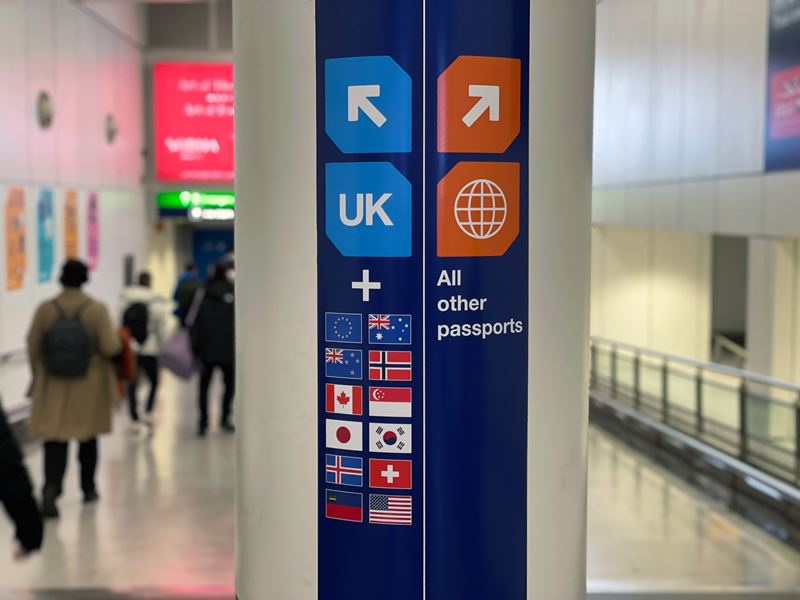
Heading off on a foreign holiday is a treat many of us spend the rest of the year looking forward to. We dream of warm seas, balmy evenings and local fresh food.
But if you are travelling in 2025 there are some important changes and dates you need to know about.
We’ve got the best advice on what is happening and how to find out what changes will affect you, to ensure you get the relaxing break you deserve.
The new Entry/Exit system is expected to come into play in 2025, after being postponed multiple times.
The EES is a border control system being set up to record the movements of non-EU nationals (including Brits) entering and leaving the Schengen area. It will use your name, nationality and passport details. You’ll register biometric details including fingerprints and facial scans to help the EU in effective border management.
In time it will make entering those countries faster, but initially it is expected to cause delays as people use the system and register for the first time.
Once registered, your details will last three years, and then you’ll have to register again.
The Schengen area was created by the European Union to guarantee free movement within the zone to more than 425 million EU citizens, along with non-EU nationals living in the EU or visiting the EU as tourists.
It includes most EU countries (including France, Spain and Italy) but not Cyprus and Ireland. It also includes the non-EU countries of Iceland, Norway, Switzerland and Liechtenstein.

In addition to the EES, the European Travel Information and Authorisation System (ETIAS) is due to launch in 2025.
This visa waiver system means UK nationals – and other non-EU travellers who previously did not require a visa to enter the EU – will need to apply to travel into and around the EU.
ETIAS will work in a similar way to the US ESTA system and cost €7. It authorises travel for up to 90 days but is valid for three years. If you get a new passport during that time, you’ll need to get a new ETIAS too.
Each UK passport holder will need to apply and pay individually.
Find out more at on the ETIAS website.
The cost of air travel is set to increase on April 1st next year, due to a £2 rise in Air Passenger Duty (APD) by the UK Government on long-haul flights. The APD increase on short-haul will follow on April 1 2026.
The increase might not sound a lot, but it means UK air tax on economy flights is now £15 per person, per flight – the highest APD in the world. Some countries, including Ireland, don't pay any.
Some budget airlines have warned the rise could mean flights are axed in 2025. APD is paid automatically on booking, although it’s often shown separately on your booking.
You can find out more about the APD increase – and see the price breakdown – at gov.uk.
What is Air Passenger Duty?
APD was introduced in 1994 by then Chancellor Kenneth Clarke to offset the environmental impact of air travel and charged by travel distance and cabin class.
Those travelling on private jets pay the most.

If you are planning on heading to the US in 2025 then it’s worth being smart with your smartphone.
A new app is being rolled out across the US during the year by the US Customs and Border Protection (CBP). The Mobile Passport Control app could really speed up your airport experience.
It works for UK visitors who are eligible for the Visa Waiver Program (VWP) and have an approved Electronic System for Travel Authorisation (ESTA). If you have a UK passport and are travelling to the US for less than 90 days, then this is likely to apply to you.
You’ll need to download the app before you fly, but it allows you to fill in your custom declaration form and submit passport information in advance, meaning you can skip some of those airport queues.
Just remember, before you hit download, check your destination airport is participating.
Some 200 Brits are being turned away at EU airports every day due to an invalid passport.
So don’t forget to double check yours before you book your trip, especially if it was issued before September 2018.
Some passports have expiry dates of up to ten years and nine months, but now the UK has left the EU, it is only valid for exactly 10 years, even if it hasn’t reached its expiry date. Some countries also insist that your passport is valid for another six months after your date of return travel.
The Home Office told Saga: “Over 7,000 appointments for urgent services are made available across the seven passport offices in the UK each week.” Don’t be one of them.
The Passport Office has more information on how to check your passport is valid. You can find out more about the changes for British passport holders in 2025 here.

EHICs are being replaced with a Global Health Insurance Card (GHIC) in 2025. They are exactly the same and are available for free from the NHS.
The UK GHIC is not a replacement for travel insurance but does get you “state healthcare that cannot reasonably wait until you come back to the UK”. This includes some maternity care, emergency treatment and routine medical care.
You can carry on using your EHIC until its expiry date and it’s possible to apply for a new GHIC card up to nine months before your current one expires.
The NHS website has more details on applying for the GHIC card.
The 100ml rule on liquids in hand luggage has meant we've been decanting our toiletries or buying travel-sized bottles since it was introduced in 2006.
New technology is being rolled out across UK airports to allow bags to be scanned for potential threats, without liquids or being removed first. The scanners would allow almost a complete relaxation of the liquids rule – up to 2 litres could be carried.
This almost happened in June 2024 at selected UK airports, but the Government delayed it, so now although at some airports you can leave liquids in your bag, everyone is still limited to 100ml.
Our advice is to check with the airport and your travel company. More updates are expected during 2025.

2024 saw demonstrations across Europe by people angry about over-tourism. In response many governments are introducing or raising tourist taxes.
2024 saw floods in Spain, super typhoons in the Philippines and Taiwan, hurricanes in the US and multiple earthquakes in Japan. Due to climate change, these natural disasters are expected to increase.
Extreme heat can have an effect on your health too. In 2023 parts of Europe saw temperatures in excess of 45C (113F).
These temperatures can be dangerous for the very young, or older people. Find out more with our guide on how to holiday during a heatwave.
Are you covered by your insurance?
If you have holiday insurance with Saga, this will cover you for a number of unpredictable situations, including natural disasters. They've got more information on travel disruption and insurance.

After some of the dramatic events across the globe in 2024, it’s important to know what to do if your destination has political or military upheavals, or worse still, you’re already there when it happens.
The Foreign Office website has a country-by-country A-Z offering advice and warnings on entry requirements, safety and security, health risks and legal differences.
By paying heed to travel changes, then you can prepare for these updates, smooth your journey and avoid any delays.
2025 is looking to be a great year to travel, with many new destinations on the up. These are some of our travel experts' recommendations as the places to go.
Victoria Philpott has written for many of the biggest travel publications, both online and print. She’s written a book about festivals, Celebrate!, and is a Lonely Planet author.
Vicky travelled the world as a digital nomad for three years before settling on the sunny south coast of England.


Booked your trip and thinking about travel insurance? When you're looking to compare travel insurance, don't settle for less.

What if... this is the best holiday you’ve never taken?
At Saga, we know that going big on the little details makes all the difference. Discover a range of expertly crafted holidays where everything’s taken care of.

From UK stays to global getaways, Saga Travel Insurance has a policy to suit you with 5 cover options.
All come with a 24/7 GP Service, no upper age limit and most pre-existing medical conditions covered.



Whether your perfect beach holiday is just sun, sea and sand, or if you like a bit of sightseeing, shopping or snorkelling thrown in, one of these might be your ideal destination.

Jetting off to Italy’s ‘Eternal City’? We reveal the best places to visit in Rome, from ancient temples to al fresco dining with a view.






A different destination every day - why a river cruise could be your perfect summer holiday.
